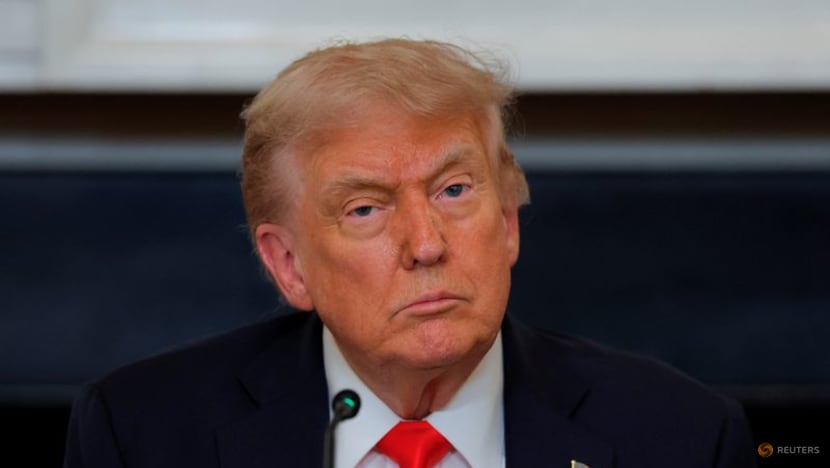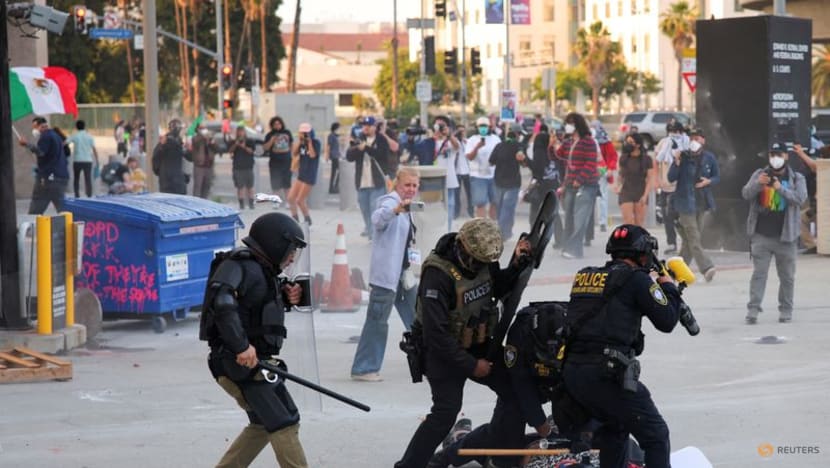Commentary: Trump’s travel ban hits Southeast Asia for the first time
Dressed up in legal justifications, President Donald Trump’s latest preordained travel ban will likely harm US geopolitical interests, says US politics expert Steven R Okun.


This audio is generated by an AI tool.
SINGAPORE: United States President Donald Trump has rebooted his travel ban, hitting Southeast Asia for the first time. He banned – partially or fully – citizens of 19 countries, including Myanmar and Laos, from entering the US with effect from Monday (Jun 9).
He clearly learned lessons from the ban he instituted initially during his first term.
Mr Trump’s playbook started with an executive order on the first day of his second term ordering the State Department to launch a global review of foreign governments’ vetting and screening capabilities and to identify which were “so deficient as to warrant” a travel ban.
This time, instead of calling it a “Muslim ban” like he did eight years ago with no study, he justified the ban for national security reasons after a review of several months, claiming also that people from those countries had high rates of overstaying their visas.
This policy, preordained but dressed in process, will likely be upheld by the courts.
“A CONVENIENT DISTRACTION” FROM BAD NEWS
The travel ban comes amid reports of the lowest US job growth in two years, strong public criticism of Mr Trump’s “Big Beautiful Bill” from Elon Musk as they feud, and an antisemitic attack a week ago.
“This noxious reboot comes as a convenient distraction from so many bad news items in the form of setbacks for the Trump agenda,” Thurgood Marshall Jr, a senior Clinton official, told me.
And while Mr Trump said last week’s Colorado “terror attack” for which an Egyptian national has been charged with injuring several with gasoline bombs spurred the timing of the travel ban, Egypt not being on the list undercuts his premise this ban would have prevented it from happening.
This ban both appeals to his core MAGA anti-immigration base and advances his governing philosophy. Mr Trump made the real message plain as he announced the travel ban: “We don’t want them.”
The “America First” agenda includes a sweeping crackdown on immigration: So far, he has barred international students from Harvard University, halted student visa interviews for those accepted to US schools and ordered immigration raids across the country.
Of course, every country can and should aim to ensure only legal and lawful immigration to their territory.
Citizens from certain countries should receive higher scrutiny for any number of reasons, including whether their government sponsors terrorism. Individuals who have a high chance of overstaying their visa can also be denied one.
A blanket ban on all citizens from a given country provides the easy way out administratively and a political win from his base; however, it brings upon the US geopolitical harm.
SOUTHEAST ASIA NOT SPARED
This time, Laos and Myanmar were included in Mr Trump’s travel ban – countries that accounted for barely 11,000 of the 72 million foreign visitors in 2024 per the Department of Commerce.
Rick Reece, Executive Director of non-governmental organisation Village Focus International, an American who has lived and worked in Laos since 1998, told me: “There are so many family connections [with the US] here. Now, uncertainty with the US comes out in anger and cynicism.”
“I hope Lao people don’t lose their respect and admiration for the US. My own son and wife, both Lao passport holders, would love to visit the US to see friends and family, but I can’t see that happening for the foreseeable future,” he added.
Tatum Albertine, a former State Department and USAID official with years of experience in Myanmar, told me it was surprising to see Myanmar included in the travel ban. “I don’t think the Trump Administration even knows what it wants out of its relationship with them,” she said.
The US had already taken a reputational hit in the country in the wake of the deadly earthquake in March. “Trump 2.0 massively failed in sending a USAID humanitarian intervention team,” she added. “[Secretary of State Marco] Rubio said they were deployed, but people on the ground tell me that was not true – those people who were ready had been fired.”
The rest of Southeast Asia, including Singapore, are also caught in Mr Trump’s continuing assault on immigration, with the halt to student visa interviews pending the expansion of “social media screening and vetting”.
No one knows how long this will last. Some students who have been accepted to US schools have no idea when, or if, they’ll be allowed to enter the country. Those already enrolled aren’t sure if they will be let back in if they head home during the summer break.
In a region where the US competes with China for influence, a ban on two ASEAN member states and collateral damage from the change to student visas could strengthen China’s hand.

AMERICA FIRST LEADS TO CHINA NEXT
While there will be no immediate fallout by banning travel from these countries given their lack of geopolitical and geoeconomic standing, there will still be consequences.
Mr Trump’s broader immigration policies create anxiety about US travel, amid unhappiness about his sweeping tariffs. A head of global public affairs at an American multinational told me she can’t have her team meet in the US this summer because many of her international staff fear travelling there.
New York City, the top US destination for international travel, estimated 2.5 million (or 17 per cent) fewer foreign travellers in 2025. Travel from Canada, the US’ top source of visitors, is expected to go down more than 20 per cent. The World Travel & Tourism Council projects a US$12.5 billion loss in international visitor spending this year.
Nelson Cunningham, who served in the Biden administration as a Senior Advisor at the State Department, told me: “If we cut off contact with the best and brightest around the world, America First cannot help but become America Alone”.
“America First inevitably leads to China Next,” he concluded.
With the new travel ban, governments will continue to seek alternate markets and partners for trade and security. Businesses will see diminish their advantages with access to foreign government officials, customers and employees.
The erosion of Brand America continues.
Steven Okun serves as CEO of APAC Advisors, a geostrategic and responsible investment consultancy based in Singapore. He served as Deputy General Counsel at the US Department of Transportation in the Administration of President Bill Clinton. APAC Advisors Associate Noemie Viterale contributed to the commentary.

















